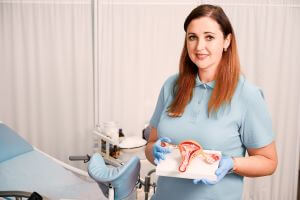You Have Alternative Options For Cervical Cancer Treatment
Cervical cancer is the second most common cancer, usually affecting women between age 40 to 55 in the United States. It affects the uterine cervix, which is the portion of the uterus that is attached to the top of the vagina. Since there are often no symptoms in the beginning stages, most cases are diagnosed and treated in an advanced stage when the treatment success rate is lower.
The incidence of cervical cancer has been declining in the US due to early detection by regular Pap smears. Cervical cancer treatment is available through our cancer care at Sunridge Medical.
 Cervical cancer begins as a precancerous lesion called a dysplasia. This stage is treatable usually without a hysterectomy and sometimes resolves on its own without treatment. This is not usually the case though; dysplasia progresses to cancer over many years. Once it has progressed to cancer, it usually becomes invasive and spreads quickly. We have treatment available at Sunridge Medical to help with your cancer care fight.
Cervical cancer begins as a precancerous lesion called a dysplasia. This stage is treatable usually without a hysterectomy and sometimes resolves on its own without treatment. This is not usually the case though; dysplasia progresses to cancer over many years. Once it has progressed to cancer, it usually becomes invasive and spreads quickly. We have treatment available at Sunridge Medical to help with your cancer care fight.
There are 3 Main Tpes of Cervical Cancers:
- Squamous cell carcinoma– typically presents as an ulcerated lesion
- Adenocarcinoma of the cervix – accounts for 5 to 20% of the cancer types and usually presents as an enlarged barrel-shaped cervix. Adenocarcinomas are becoming more common in women who were born in the last 20 to 30 years.
- Adenosquamous carcinomas – these are cancers which have both features of squamous cell carcinomas and adenocarcinomas and are less common.
HPV and Cervical Cancer
Human papilloma virus (HPV) is the most significant risk factor for cervical cancer. This is an example of where an infection is the cause of cancer and why having a healthy immune system is so important. By keeping the immune system strong, many cases of cancer can be prevented.
Other risk factors for cervical cancer include having a history of chlamydia, having multiple sexual partners, starting sexual relations at a young age, and being a smoker as tobacco by-products have been found in cervical mucus.
Treatment and staging of cervical cancer can range from surgery to chemotherapy depending on the development of cancer, the size and shape of the tumor, the age and general health of the woman and her desire to have children in the future. Pre-invasive stages may be completely treated with excisional biopsy, cryosurgery, or laser destruction. Invasive squamous cell carcinoma therapy may include hysterectomy and radiation therapy. Do not wait to get treatment, it is important to seek treatment immediately following diagnosis.
Common Signs and Symptoms of Cervical Cancer:
- Vaginal discharge
- Bleeding after intercourse
- Abnormal vaginal bleeding or spotting
- Pelvic pain
- Painful urination
- Pain during sexual intercourse
Alternative Cervical Cancer Treatment
At Sunridge Medical, our highly-trained physicians are experts in providing an integrated approach to the alternative treatment of cervical cancer. Our treatment plans are individualized, even for patients with the same type of cancer, and involve both traditional and alternative treatment medicines. We have integrated advanced, research-based alternative medicines with conventional therapies into a comprehensive, individualized treatment program that offers patients optimal success.
Research on Alternative Cancer
Zaman, M., Chauhan, N., Yallapu, M. et al. Curcumin Nanoformulation for Cervical Cancer Treatment. Sci Rep 6, 20051 (2016). https://doi.org/10.1038/srep20051
Abstract
Cervical cancer is one of the most common cancers among women worldwide. Current standards of care for cervical cancer includes surgery, radiation and chemotherapy. Conventional chemotherapy fails to elicit therapeutic responses and causes severe systemic toxicity. Thus, developing a natural product based, safe treatment modality would be a highly viable option. Curcumin (CUR) is a well-known natural compound, which exhibits excellent anti-cancer potential by regulating many proliferative, oncogenic and chemo-resistance associated genes/proteins. However, due to rapid degradation and poor bioavailability, its translational and clinical use has been limited. To improve these clinically relevant parameters, we report a poly(lactic-co-glycolic acid) based curcumin nanoparticle formulation (Nano-CUR). This study demonstrates that in comparison to free CUR, Nano-CUR effectively inhibits cell growth, induces apoptosis and arrests the cell cycle in cervical cancer cell lines. Nano-CUR treatment modulated entities such as miRNAs, transcription factors and proteins associated with carcinogenesis. Moreover, Nano-CUR effectively reduced the tumor burden in a pre-clinical orthotopic mouse model of cervical cancer by decreasing oncogenic miRNA-21, suppressing nuclear β-catenin and abrogating expression of E6/E7 HPV oncoproteins including smoking compound benzo[a]pyrene (BaP) induced E6/E7 and IL-6 expression. These superior pre-clinical data suggest that Nano-CUR may be an effective therapeutic modality for cervical cancer.
For answers or to make an appointment, call us toll-free at 800-923-7878 to speak with a Patient Care Team.
Recover your vitality, reclaim your energy and rediscover your health.


